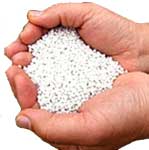Bio- Fertiliser
 Bio fertilisers or more specifically "Microbial bio fertilisers" are biologically active inputs contains one or more types of beneficial microorganisms such as bacteria, algae or fungi. Every microorganism and hence each type of bio fertiliser has a specific capability and function.
Bio fertilisers or more specifically "Microbial bio fertilisers" are biologically active inputs contains one or more types of beneficial microorganisms such as bacteria, algae or fungi. Every microorganism and hence each type of bio fertiliser has a specific capability and function.
The microorganisms in the bio fertiliser restore the soils natural nutrient cycle and build soil organic matter. Through the use of bio fertilisers, healthy plants can grow while enhancing the sustainability and health of the soil. These are economical and environmental friendly.
There are broadly eight types of bio fertilisers, they are
- Rhizobia: Rhizobium is a group of bacteria that fixes nitrogen in association with the roots of leguminous crops. It can fix 40-20 Kgs of nitrogen per acre annually depending upon the environmental conditions. Every leguminous crop requires a specific rhizobium species. These bacteria have no harmful effect on nature and environment.
- Azotobacter: Azotobacter is a group of free-living nitrogen fixing bacteria. They are not associated with leguminous plants and hence can be used for any type of crops. Unlike Rhizobia they do not form root nodules. They also produce beneficial growth substances and beneficial antibiotics that help control root diseases.
- Azospirillum: Azospirillum is a beneficial soil borne bacterium capable of fixing considerable quantity of nitrogen in soil. This bacterium when applied to soil multiplies in billions and absorbs the atmospheric nitrogen and fixes the same in the root zone of soil. Unlike Rhizobia they do not form root nodules or associate with leguminous crops. Addition of well-decomposed organic manure with sufficient moisture and alkaline pH (above 6.0) is very important for multiplication of Azospirillum. Repeated addition of Azospirillum will help to reduce and eventually stop addition of nitrogenous fertilizers in soil.
- Blue -Green Algae: Blue-Green Algae or Cyanobacteria are free-living nitrogen fixing photosynthetic algae. These algae grow only on alkaline conditions with sufficient moisture.
- Azolla: Azolla is a free floating water fern that fixes nitrogen in association with a specific species of Cyanobacteria. Azolla is a good source for nitrogen and various micronutrients on decomposition. Azolla can be mass-produced on your farm itself. (Read more). It can be used as green manure as well as cattle feed.
- Phosphate-Solubilising micro organisms: Naturally occurring soil-borne Phosphorus solubilising bacterium produces organic acids and converts insoluble inorganic phosphatic compounds in soil into soluble form and makes them available to plants. Long term application of Phosphobacterium, reduces requirement of Phosphatic fertilisers. They require sufficient organic matter in the soil for their multiplication.
- Potash Mobilising bacteria: Naturally occurring soil-borne Potash Mobilising bacterium helps to mobilise potassium fixed in soil. This mobilized potassium is easily
- Zinc Solubilising bacteria : Naturally occurring soil-borne Zinc Solubilising bacterium secrete organic acids and helps to solubilise insoluble and chelated Zinc fixed in soil. This mobilized zinc is easily available to the plants.
We are providing training and consultancy in various aspects of bio fertiliser usage and production.For more information please mail to info@harithaorganicfarms.com. Our technical experts will contact you for further assistance.






